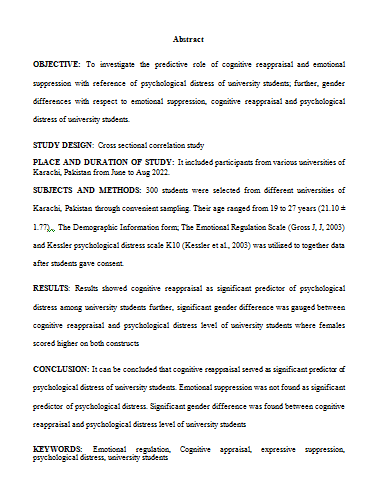ROLE OF EMOTIONAL REGULATION STRATEGIES IN DETERMINING PSYCHOLOGICAL DISTRESS AMONG UNDERGRADUATE UNIVERSITY STUDENTS
Abstract
Downloads
References
References
Constitution of the World Health Organization. 2005. In: World Health Organization: Basic documents: 45. Available: https://www.who.int/about/governance/constitution
Horwitz AV. Distinguishing distress from disorder as psychological outcomes of stressful social arrangements. Health , 2007; 11(3), 273-89.
Mirowsky J, Ross CE. Depression, parenthood, and age at first birth. Social Science & Medicine, 2002, 54(8), 1281–1298.
Fagring, A J, Kjellgren K I, Rosengren A, Lissner L, Manhem K., Welin C. Depression, anxiety, stress, social interaction and health-related quality of life in men and women with unexplained chest pain. BMC public health. 2008; 8, 165.
Cvetkovski S, Reavley NJ, Jorm AF. The prevalence and correlates of Psychological distress in Australian tertiary students compared to their community peers. The Australian and New Zealand Journal of Psychiatry. 2012;46(5):457-467.
Stallman HM. Psychological distress in university students: A comparison with general population data. Australian Psychologist. 2010; 45(4): 249-257.
Foster J, Allen B, Oprescu F, McAllister M. Mytern: An innovative approach to increase students’ achievement, sense of wellbeing and levels of resilience. Journal of the Australian and New Zealand Student Services Association.2014; 43: 31-40.
Ryan ML, Shochet I.M, Stallman H M. Universal online interventions might engage psychologically distressed university students who are unlikely to seek formal help. Advances in Mental Health . 2010; 9(1): 73–83.
Wynaden D, McAllister M, Tohotoa J, Al Omari O, Heslop K, Duggan R, Byrne L. The silence of mental health issues within university environments: A quantitative study. Archives of Psychiatric Nursing, 2014; 28: 339-344.
Schneider RL, Arch JJ, Landy L.N, Hankin BL. The longitudinal effect of emotion regulation strategies on anxiety levels in children and adolescents. Journal of Clinical Child and Adolescent Psychology. 2016; 47(6): 978-991.
Kovacs M, Lopez-Duran NL . Contextual Emotion Regulation Therapy: A Developmentally- Based Intervention for Pediatric Depression. Child and Adolescent Psychiatric Clinics of North America ,2012; 21(2): 327–343.
Weems, CF. Developmental trajectories of childhood anxiety: Identifying continuity and change in anxious emotion. Developmental Review . 2008 ; 28(4):488 502.
Thompson RA. Emotion regulation: a theme in search of definition. Monogr Soc Res Child Dev. 1994; 59: 25–52.
Gross JJ. Emotion regulation in adulthood: timing is everything. Current Trends in Psychological Science. 2001;10: 214–219.
Garnefski N, Kraaij V, Spinhoven P. Negative life events, cognitive emotion regulation and emotional problems. Personality and Individual Differences.2001;30: 1311–1327
Higgins ET, Bond RN, Klien R, Strauman T. Self-discrepancies and emotional vulnerability: how magnitude, accessibility, and type of discrepancy influence affect. Journal of Personality and Social Psychology.1986; 51: 5–15.
Gross JJ, John OP. Individual differences in two emotion regulation processes: implication for affect, relationships, and well-being. Journal of Personality and Social Psychology.2003; 85:348–362.
Richards JM, Gross JJ. Emotion regulation and memory: the cognitive costs of keeping one’s cool. Journal of Personality and Social Psychology.2000; 79: 410–424
Gross JJ, John OP. Individual differences in two emotion regulation processes: implication for affect, relationships, and well-being. Journal of Personality and Social Psychology.2003; 85:348–362.
Kessler RC, Barker PR, Colpe LJ, Epstein JF, Gfroerer, JC, Hiripi E. Screening for serious mental illness in the general population . Arch Gen Psychiatry, 2003; 60(2): 184-189.
Pervez S, Saleem S, Zahra ST.Cognitive Reappraisal and Mental Health Problems in Female University Teachers during COVID-19: A Mediating Role of Emotional Exhaustion. Journal of Postgraduate Medical Institute . 2022; 36(3): 186-190
VallyZ , Ahmed K. Emotional regulation strategies and psychological well being : Examining cognitive reappraisal and expressive suppression in an Emirati college sample . Neurology Psychiatry and Brain Research, 2021; 38: 27-32.
Deatherae S, Servaty-Seib H, Aksoz I. Stress, coping, and internet use of college students. Journal of American College Health. 2014; 62(1) :40–46.
Brougham RR, Zail CM, Mendoza CM, & Miller J. Stress. Sex differences and Coping strategies among college students . Current Psychology.2009; 28:85–97.
Harutyunyan A, Musheghyan L, Hayrumyan V. Gender differences in perceived stress Level among undergraduate students in Armenia. European Journal of Public Health, 2020; 30(5):166-1028.
Preston T , Carr D C, Hajcak G, Sheffler J, Sachs-Ericsson N. Cognitive reappraisal, emotional suppression, and depressive and anxiety symptoms in later life: The moderating role of gender. Aging & mental health, 2021;1–9. Advance online publication.
Copyright © JPPS. Published by Pakistan Psychiatric Society
Licensing: This work is licensed under Creative Commons Attribution-NonCommercial 4.0 International License
Readers may “Share-copy and redistribute the material in any medium or format” and “Adapt-remix, transform, and build upon the material”. The readers must give appropriate credit to the source of the material and indicate if changes were made to the material. Readers may not use the material for commercial purposes. The readers may not apply legal terms or technological measures that legally restrict others from doing anything the license permits.







.png)









